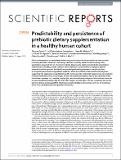| dc.contributor.author | Ananthakrishnan, Ashwin | |
| dc.contributor.author | Kassam, Zain | |
| dc.contributor.author | Gurry, Thomas Jerome | |
| dc.contributor.author | Gibbons, Sean Michael | |
| dc.contributor.author | Nguyen, Le Thanh Tu | |
| dc.contributor.author | Jiang, Xiaofang | |
| dc.contributor.author | Duvallet, Claire | |
| dc.contributor.author | Alm, Eric J | |
| dc.contributor.author | Kearney, Sean Michael | |
| dc.date.accessioned | 2019-03-07T15:22:42Z | |
| dc.date.available | 2019-03-07T15:22:42Z | |
| dc.date.issued | 2018-08 | |
| dc.date.submitted | 2018-03 | |
| dc.identifier.issn | 2045-2322 | |
| dc.identifier.uri | http://hdl.handle.net/1721.1/120787 | |
| dc.description.abstract | Dietary interventions to manipulate the human gut microbiome for improved health have received increasing attention. However, their design has been limited by a lack of understanding of the quantitative impact of diet on a host’s microbiota. We present a highly controlled diet perturbation experiment in a healthy, human cohort in which individual micronutrients are spiked in against a standardized background. We identify strong and predictable responses of specific microbes across participants consuming prebiotic spike-ins, at the level of both strains and functional genes, suggesting fine-scale resource partitioning in the human gut. No predictable responses to non-prebiotic micronutrients were found. Surprisingly, we did not observe decreases in day-to-day variability of the microbiota compared to a complex, varying diet, and instead found evidence of diet-induced stress and an associated loss of biodiversity. Our data offer insights into the effect of a low complexity diet on the gut microbiome, and suggest that effective personalized dietary interventions will rely on functional, strain-level characterization of a patient’s microbiota. | en_US |
| dc.publisher | Nature Publishing Group | en_US |
| dc.relation.isversionof | http://dx.doi.org/10.1038/s41598-018-30783-1 | en_US |
| dc.rights | Creative Commons Attribution 4.0 International license | en_US |
| dc.rights.uri | https://creativecommons.org/licenses/by/4.0/ | en_US |
| dc.source | Scientific Reports | en_US |
| dc.title | Predictability and persistence of prebiotic dietary supplementation in a healthy human cohort | en_US |
| dc.type | Article | en_US |
| dc.identifier.citation | Gurry, Thomas et al. “Predictability and Persistence of Prebiotic Dietary Supplementation in a Healthy Human Cohort.” Scientific Reports 8, 1 (August 2018): 12699 © 2018 The Author(s) | en_US |
| dc.contributor.department | Massachusetts Institute of Technology. Center for Microbiome Informatics and Therapeutics | en_US |
| dc.contributor.department | Massachusetts Institute of Technology. Department of Biological Engineering | en_US |
| dc.contributor.mitauthor | Gurry, Thomas Jerome | |
| dc.contributor.mitauthor | Gibbons, Sean Michael | |
| dc.contributor.mitauthor | Nguyen, Le Thanh Tu | |
| dc.contributor.mitauthor | Kearney, Sean M | |
| dc.contributor.mitauthor | Jiang, Xiaofang | |
| dc.contributor.mitauthor | Duvallet, Claire | |
| dc.contributor.mitauthor | Alm, Eric J | |
| dc.relation.journal | Scientific Reports | en_US |
| dc.eprint.version | Final published version | en_US |
| dc.type.uri | http://purl.org/eprint/type/JournalArticle | en_US |
| eprint.status | http://purl.org/eprint/status/PeerReviewed | en_US |
| dc.date.updated | 2019-02-15T16:05:18Z | |
| dspace.orderedauthors | Gurry, Thomas; Gibbons, Sean M.; Nguyen, Le Thanh Tu; Kearney, Sean M.; Ananthakrishnan, Ashwin; Jiang, Xiaofang; Duvallet, Claire; Kassam, Zain; Alm, Eric J. | en_US |
| dspace.embargo.terms | N | en_US |
| dc.identifier.orcid | https://orcid.org/0000-0002-8639-1860 | |
| dc.identifier.orcid | https://orcid.org/0000-0001-7012-1121 | |
| dc.identifier.orcid | https://orcid.org/0000-0002-8033-8380 | |
| dc.identifier.orcid | https://orcid.org/0000-0002-0955-8284 | |
| dc.identifier.orcid | https://orcid.org/0000-0002-8093-8394 | |
| dc.identifier.orcid | https://orcid.org/0000-0001-8294-9364 | |
| mit.license | PUBLISHER_CC | en_US |
